| Listing 1 - 10 of 61 | << page >> |
Sort by
|
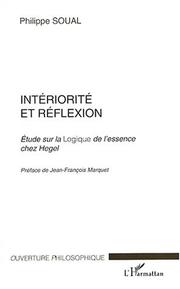
ISBN: 2747500810 9782747500814 Year: 2005 Publisher: Paris : L'Harmattan,
Abstract | Keywords | Export | Availability | Bookmark
 Loading...
Loading...Choose an application
- Reference Manager
- EndNote
- RefWorks (Direct export to RefWorks)
Reflection (Philosophy) --- Essentialism (Philosophy) --- History --- Logic --- Essence (Philosophie) --- Logique --- Histoire --- Hegel, Georg Wilhelm Friedrich, --- Reflection (Philosophy) - History - 19th century. --- Essentialism (Philosophy) - History - 19th century. --- Essence (philosophie) --- Identité --- Kant, Emmanuel (1724-1804) --- Transcendantalisme --- Congrès --- Métaphysique
Book
ISSN: 1616346X ISBN: 9783161491955 3161491955 Year: 2007 Volume: 26 Publisher: Tübingen Mohr Siebeck
Abstract | Keywords | Export | Availability | Bookmark
 Loading...
Loading...Choose an application
- Reference Manager
- EndNote
- RefWorks (Direct export to RefWorks)
Religion --- Philosophy --- History --- Kierkegaard, Søren, --- Religious studies --- Kierkegaard, Søren --- Religion - Philosophy - History - 19th century --- Kierkegaard, Søren, - 1813-1855
Book
ISBN: 9703212816 9703212824 9703212832 9789703212828 9789703212811 9789703212835 Year: 2003 Volume: 2 Publisher: México, D.F. Universidad Nacional Autónoma de México
Abstract | Keywords | Export | Availability | Bookmark
 Loading...
Loading...Choose an application
- Reference Manager
- EndNote
- RefWorks (Direct export to RefWorks)
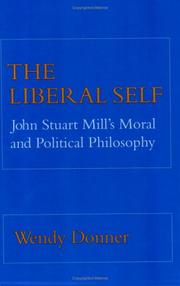
ISBN: 0801499879 Year: 1991 Publisher: Ithaca, N.Y. Cornell University Press
Abstract | Keywords | Export | Availability | Bookmark
 Loading...
Loading...Choose an application
- Reference Manager
- EndNote
- RefWorks (Direct export to RefWorks)
Mill, John Stuart --- Ethics [Modern ] --- 19th century --- Political science --- Philosophy --- History --- Mill, John Stuart, 1806-1873. --- Ethics, Modern - 19th century. --- Political science - Philosophy - History - 19th century.
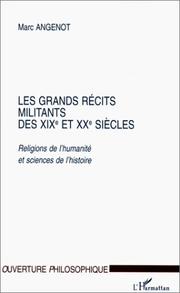
ISBN: 2738488978 9782738488978 Year: 2000 Volume: *36 Publisher: Paris: L'Harmattan,
Abstract | Keywords | Export | Availability | Bookmark
 Loading...
Loading...Choose an application
- Reference Manager
- EndNote
- RefWorks (Direct export to RefWorks)
religieus socialisme --- wetenschappelijk socialisme --- Socialism --- Utopian socialism --- Ideology --- Social sciences --- Philosophy --- History --- Utopias --- 19th century --- 20th century --- Socialism - Philosophy - History - 19th century --- Socialism - Philosophy - History - 20th century --- Utopian socialism - History - 19th century --- Utopian socialism - History - 20th century --- Ideology - History - 19th century --- Ideology - History - 20th century --- Social sciences - Philosophy - History - 19th century --- Social sciences - Philosophy - History - 20th century
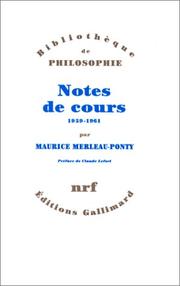
ISBN: 2070739813 9782070739813 Year: 1996 Volume: *8 Publisher: Paris Gallimard
Abstract | Keywords | Export | Availability | Bookmark
 Loading...
Loading...Choose an application
- Reference Manager
- EndNote
- RefWorks (Direct export to RefWorks)
Poursuivant les éditions posthumes des manuscrits de Maurice Merleau-Ponty commencées en 1964, nous publions les notes de préparation aux cours du Collège de France de 1959 et 1961. Chacun de ces cours interroge d'une manière différente l'exercice philosophique. Comment la philosophie est-elle possible aujourd'hui après l'entreprise phénoménologique ? Dans le cours de 1959, Merleau-Ponty présente une étude de Husserl et de Heidegger. Il en montre les apports mais aussi les limites. En outre, il a recours à l'interprétation de la philosophie qu'élaborent Hegel et Marx, et son geste se donne aussi comme un travail d'auto-interprétation. La lecture qu'il propose de Descartes rend sensible les différents niveaux de sa démarche. Il nous a semblé intéressant d'associer à ces notes de cours la première rédaction du chapitre " Interrogation et intuition " du Visible et l'invisible qui est en grande affinité avec les problèmes abordés dans ces cours. Ce brouillon du Visible et l'invisible, abandonné par Merleau-Ponty, permet de marquer la différence de style d'avec les notes de préparation qui, comme l'écrit Claude Lefort, " ne constituent pas exactement un écrit ". Elles offrent bien plutôt des éléments de réflexion pour continuer de questionner la pensée du philosophe. Claude Lefort écrit encore : " (...) si l'on veut bien accueillir leur indécision (...), si on les aborde dans la mémoire de l'œuvre de Merleau-Ponty, (...) alors, nul doute que l'ouvrage de la pensée ne se fasse sensible dans les percées, les retraits, les lacunes, le heurt des phrases, des mots (...).
Metaphysics --- Ontology --- Philosophy, Modern --- Ontologie --- Philosophie moderne --- Philosophy. --- Ontology. --- Philosophy --- History --- -Philosophy --- -Mental philosophy --- Humanities --- Being --- Necessity (Philosophy) --- Substance (Philosophy) --- -History --- -Ontology --- -Ontology. --- Mental philosophy --- Philosophy - History - 19th century. --- Philosophy - History - 20th century.
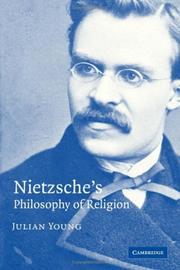
ISBN: 0521681049 9780521681049 0521854229 9780521854221 9780511584411 9780511281983 0511281986 0511584415 1139810413 9781139810418 1107155002 9781107155008 1107318440 9781107318441 0511281218 9780511281211 0511280793 9780511280795 0511281609 9780511281600 129939891X Year: 2006 Publisher: Cambridge Cambridge University Press
Abstract | Keywords | Export | Availability | Bookmark
 Loading...
Loading...Choose an application
- Reference Manager
- EndNote
- RefWorks (Direct export to RefWorks)
In his first book, The Birth of Tragedy, Nietzsche observes that Greek tragedy gathered people together as a community in the sight of their gods, and argues that modernity can be rescued from 'nihilism' only through the revival of such a festival. This is commonly thought to be a view which did not survive the termination of Nietzsche's early Wagnerianism, but Julian Young argues, on the basis of an examination of all of Nietzsche's published works, that his religious communitarianism in fact persists through all his writings. What follows, it is argued, is that the mature Nietzsche is neither an 'atheist', an 'individualist', nor an 'immoralist': he is a German philosopher belonging to a German tradition of conservative communitarianism - though to claim him as a proto-Nazi is radically mistaken. This important reassessment will be of interest to all Nietzsche scholars and to a wide range of readers in German philosophy.
Religious studies --- Nietzsche, Friedrich W. --- Religion --- Philosophy --- History --- Nietzsche, Friedrich Wilhelm, --- Religion. --- Nietzsche, Friedrich --- Nietzsche, Friedrich Wilhelm --- Nietzsche, Friederich --- Arts and Humanities --- Religion - Philosophy - History - 19th century. --- Nietzsche, Friedrich Wilhelm, - 1844-1900 - Religion. --- Nietzsche, Friedrich Wilhelm, - 1844-1900
Book
ISBN: 8874482035 9788874482030 Year: 1988 Volume: 37 Publisher: Roma : Gangemi,
Abstract | Keywords | Export | Availability | Bookmark
 Loading...
Loading...Choose an application
- Reference Manager
- EndNote
- RefWorks (Direct export to RefWorks)
Language and languages --- Philosophy, Modern --- Langage et langues --- Philosophie --- Philosophy --- History --- Histoire --- Philosophy, Modern - 19th century. --- Philosophy, Modern - 20th century. --- Language and languages - Philosophy - History - 19th century. --- Language and languages - Philosophy - History - 20th century.
Book
ISBN: 8870264998 9788870264999 Year: 1983 Publisher: Padova Messaggero
Abstract | Keywords | Export | Availability | Bookmark
 Loading...
Loading...Choose an application
- Reference Manager
- EndNote
- RefWorks (Direct export to RefWorks)
Religion --- Philosophy --- History --- 291 --- -Religion --- -Religion, Primitive --- Atheism --- God --- Irreligion --- Religions --- Theology --- Godsdienstwetenschap: vergelijkend --- -History --- -Philosophy --- -291 --- -Godsdienstwetenschap: vergelijkend --- Religion - Philosophy - History - 19th century --- Religion - Philosophy - History - 20th century
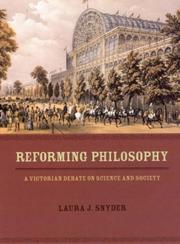
ISBN: 0226767337 Year: 2006 Publisher: Chicago University of Chicago press
Abstract | Keywords | Export | Availability | Bookmark
 Loading...
Loading...Choose an application
- Reference Manager
- EndNote
- RefWorks (Direct export to RefWorks)
A philosophically and historically sensitive account of the engagement of the major protagonists of Victorian British philosophy, 'Reforming Philosophy' considers the controversies between William Whewell and John Stuart Mill on the topics of science, morality, politics, and economics. By situating their debate within the larger context of Victorian society and its concerns, Laura Snyder shows how two very different men& Whewell, an educator, Anglican priest, and critic of science; and Mill, a philosopher, political economist, and parliamentarian& reacted to the challenges of their times, each seeking to reform science as a means of reforming society as a whole. The first book-length examination of the dispute between Mill and Whewell in its entirety, 'Reforming Philosophy' provides a rich and nuanced understanding of the intellectual spirit of Victorian Britain and will be welcomed by philosophers and historians of science, scholars of Victorian studies, and students of the history of philosophy and political economy.
Philosophy, English --- Political science --- Science --- Philosophy --- History --- Mill, John Stuart, --- Whewell, William, --- Mill, John Stuart. --- Mill, John Stuart, 1806-1873. --- Philosophy, English - 19th century. --- Philosophy, English -- 19th century. --- Political science - Philosophy - History - 19th century. --- Political science -- Philosophy -- History -- 19th century. --- Science - Philosophy - History - 19th century. --- Science -- Philosophy -- History -- 19th century. --- Whewell, William. --- Whewell, William, 1794-1866. --- Philosophy & Religion --- Whewell, W. --- Mil, Zhūn Istīwārt, --- Mill, Dzhon Sti︠u︡art, --- Miru, Jon S., --- Mi-erh, Yüeh-han, --- Mi-erh, Yüeh-han Ssu-tʻu-ya-tʻe, --- Mill, J. S. --- Mil, --- Mil, G'on Sṭyuʼarṭ, --- Miru, --- מילל, דושאהן סטוארט --- מילל, דזשאהן סטוארט --- מיל, ג׳ון סטיוארט --- מיל, ג׳ון סטיוארט בן י׳מס, --- מיל, ג'ון סטיוארט, --- ميل، جون ستيوارت،, --- ミルジヨンスチユアート, --- 彌爾, --- 穆勒, --- Mil, Džon Stjuart, --- Whewell, William --- 穆勒
| Listing 1 - 10 of 61 | << page >> |
Sort by
|

 Search
Search Feedback
Feedback About UniCat
About UniCat  Help
Help News
News